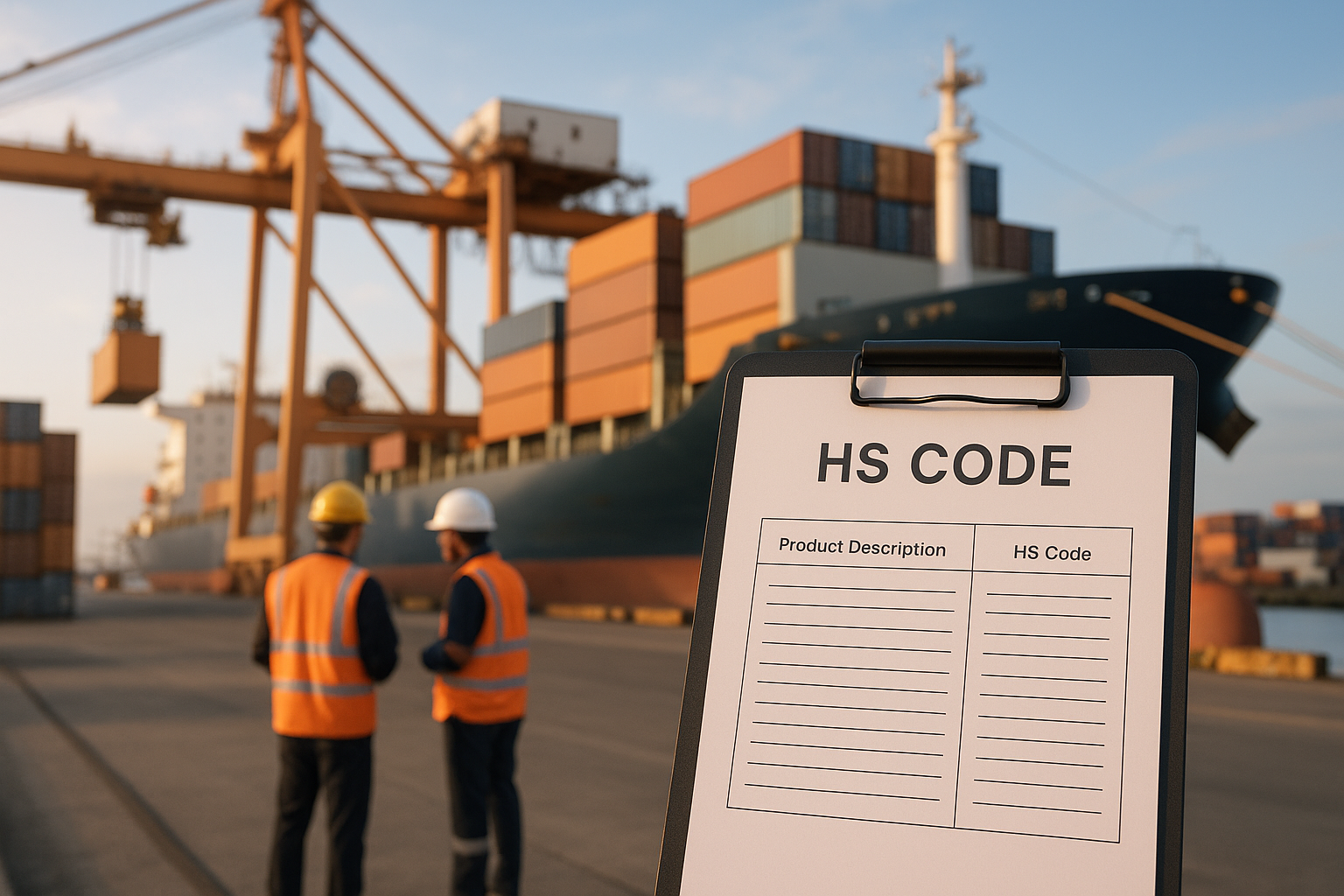Right HS codes are key to easy world trade. These six-digit codes sort goods for customs and make sure rules of global trade are met. Wrong codes may lead to:
- Fines and Holds: Bad codes lead to fines, held shipments, and more papers to fill out.
- More Costs: Goods with wrong codes might face wrong taxes, duties, or miss savings from trade deals.
- Hurt Name: Delays or mistakes can damage trust from customers and break supply lines.
To dodge these troubles, companies should set clear sorting steps, check codes twice, and ask experts if needed. Right HS codes save cash, avoid holds, and keep things running smooth.
What is an HS Code? Why is it So Important in Global Trade? | HS Code Explained by iKargos.
Problems with Wrong HS Codes
Using wrong HS codes can cause big issues for US firms. These errors can mess up operations and cut into profits. The results are often fines, late shipments, and more checks.
Customs Fines and Delays
The US Customs and Border Protection (CBP) cares a lot about HS code correctness. Wrong goods codes can bring big fines and higher duty costs. And there’s more – mistakes may hold up cargo, needing more papers to fix the mess. These hold-ups can hurt supply chains, forcing firms to face money issues like needing bonds or paying early. If issues pop up, CBP might check past shipments more, making things harder.
More Checks and More Work
Errors in HS codes can also make CBP check your items more. These extra checks slow down imports, raise costs, and add more paperwork. Firms marked for compliance problems may need to give more papers for future shipments, making it all more tough. This extra focus can spoil a firm’s customs record, making it tough to get into fast processing programs. Getting HS codes right isn’t just to dodge fines – it’s crucial for smooth operations and saving your money.
How Wrong HS Codes Hurt Money
Picking the wrong HS codes can hit a company’s money hard. This can lead to fines, mess up cash flow, and mess up budget plans. The two big ways it hurts are through errors in duties and taxes and lost trade benefits.
Duty and Tax Errors
Messing up HS codes can mean paying too much or too little in duties and taxes – both of which cost money.
- Paying too much: When wrong codes mean higher duty rates, firms often wait a long time to get their money back. This holds up cash that could be used in other ways.
- Paying too little: If duties are too low due to wrong classifying, customs will find out. When they do, companies must pay the owed amount, plus interest and fines. These issues usually pop up during checks, which can happen long after goods are sent, making it tough to plan and handle money.
Getting classifications wrong not only affects duties – it also stops firms from getting trade benefits, adding more money issues.
Loss of Trade Benefits
Right HS codes are key to getting shipments lower tariffs or no duties under deals like USMCA or plans like GSP.
With a wrong HS code, shipments miss these perks. This means no big savings over time, especially for companies that use these trade deals a lot. Errors here aren’t just expensive short-term – they can lead to big losses after a while.
sbb-itb-b840488
How to Make Sure HS Code is Right
Keeping the HS code right is key to easy customs checks and low money risks. Set up a clear way, check codes, and ask for expert help to cut down on big mistakes.
Set Up a Sure Way to Classify
Begin by making a set way that keeps the same steps every time your team picks HS codes. Write down the steps, so there’s no mix-up on how to sort items.
Look closely at product details – like what it’s made of, what it does, and what it’s for – to find the right codes. Teach your team to use the HS code order, starting with big groups down to exact six-digit codes.
Keep up with every few months changes from the World Customs team and U.S. leaders. These changes could shift how your items are sorted, so add them into your steps.
Once your way is set, double-check each code before you send it to be sure it’s right.
Double-Check Codes Before You Send Them
Even a good process can slip up, so always check your codes twice. Look very closely at big money shipments over $50,000, as errors here can cost a lot.
Keep a main list of checked codes that others have looked at for correctness. Do checks every month on codes you use a lot to find any wrong details fast.
If you’re not sure about a sort, try it out with a test shipment. By sending a bit first, you can see how customs sorts it without risking many items.
This check sets you up to bring in experts when you have harder cases.
Get Help from Experts
When problems show up, getting help from pros can keep you from sorting errors.
- Customs helpers know a lot from working with different ports and items. Their know-how helps a lot with complex goods or new markets.
- Sort pros only work on HS codes and know the tough or unclear cases well. They help a lot with new or odd items that don’t easily fit known groups.
- Rule asks to U.S. Customs give you a clear guide. If unsure about a sort, you can ask for a written rule. This might take some time but gives you a clear answer and keeps your business safe later.
Also, business groups often give good tips to keep your item sorts steady.
Getting HS Code Right Keeps Money Safe
Making sure HS codes are correct does more than ease the custom processes – it protects the money health of your business. Errors in HS codes can bring fees and delays, messing up your budget and blocking growth.
Cutting Down on Unexpected Costs
Wrong HS codes might cause extra fees, interest, and fines. These sudden costs can empty your funds and mess up your money flow. Being correct stops these problems, keeping your money stable and sure.
Making Credit Insurance Better
Right HS codes help handle money risk too. When your codes are right, goods clear customs easy, bringing on-time delivery and strong relationships with buyers. This steady work helps credit insurance, protecting your business from late payments, buyer failure, and other money risks.
CreditInsurance.com has tools and help so businesses see how right HS code use makes money stable. With easier customs steps, your money to get holds strong, making room for better money options and growth.
Conclusion: Why Correct HS Codes Matter
Getting your HS codes right is key not just for meeting rules – it keeps your business safe and helps it do well for a long time. Right codes let you avoid fines, stop delays in shipping, and deal with rules that could mess up your work and cost you a lot.
The money benefit is clear. Right HS codes mean no sudden fees, steady money coming in, and good deals on trade like lower taxes and special treatment in trade deals. This leads to smooth work and better money health.
But there’s more good stuff. Right HS code use makes sure things move through customs well, gets things where they need to go on time, and builds strong ties with your buyers. These things help make your business look better to banks and can make insurance plans for selling on credit better. This helps you deal with risks of not getting paid and handle buyer problems well.
By getting better at managing HS codes – through team training, help from experts, or making your own ways better – you can keep customs simple, cut costs, and keep your money safe. Businesses that focus on these things dodge problems and do well in global trade for a long time.
For more on how selling on credit insurance can protect your business, go to CreditInsurance.com.
FAQs
How can firms make sure their HS codes are right, and why is it key to get help from experts?
Right HS codes are key for smooth trade across borders. Wrong codes can lead to delays, fines, or even serious legal issues. To cut these risks, firms should use smart tools, do deep checks, and have regular checks on their codes. These steps help firms follow rules and cut down on mistakes.
Experts are vital in this work by giving deep know-how to right set goods, check codes, and keep up with rule changes. Their skill helps firms keep sharp, dodge big fines, and keep trade moving well.



